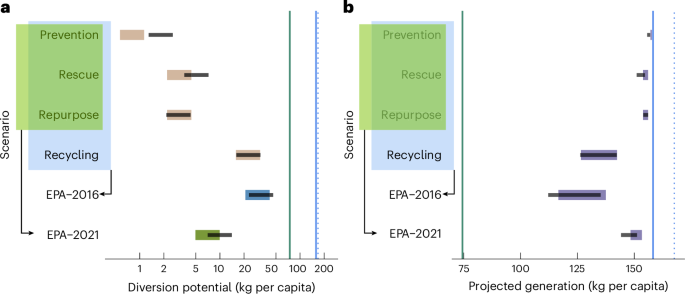State-level policies alone are insufficient to meet the federal food waste reduction goal in the United States
IF 21.9
Q1 FOOD SCIENCE & TECHNOLOGY
引用次数: 0
Abstract
The United States Food Loss and Waste Reduction Goal seeks to reduce national food waste by 50%, down to 74 kg per capita, by 2030. Here we investigate state policies’ alignment with the federal goal across four policy categories. We develop a policy scoring matrix and apply it to wasted food solutions listed in the non-profit ReFED’s database to derive ranges of food waste diversion potential and projected generation across states. On the basis of state policies alone, no state can meet the federal target. We estimated a diversion potential of 5–14 kg per capita and a food waste generation of 149 kg per capita nationally in 2022, equivalent to the 2016 baseline. Without additional intervention at the state and federal level promoting a shift from food waste recycling towards prevention, rescue and repurposing, food generation in the United States will probably remain high. A modelling study shows that the emphasis on recycling food waste over prevention, rescue and redirection impedes the progress of the United States Food Loss and Waste Reduction Goal to halve food waste by 2030.


在美国,仅靠州一级的政策不足以达到联邦减少食物浪费的目标
美国减少粮食损失和浪费目标旨在到2030年将全国粮食浪费减少50%,降至人均74公斤。在这里,我们调查了四个政策类别中州政策与联邦目标的一致性。我们开发了一个政策评分矩阵,并将其应用于非营利ReFED数据库中列出的食物浪费解决方案,以得出各州食物浪费转移潜力和预计发电量的范围。仅根据各州的政策,没有一个州能达到联邦的目标。我们估计,到2022年,全国人均食物浪费潜力为5-14公斤,人均食物浪费量为149公斤,相当于2016年的基线。如果没有州和联邦政府的额外干预,推动从食物垃圾回收到预防、救援和再利用的转变,美国的食物产量可能会保持在高位。
本文章由计算机程序翻译,如有差异,请以英文原文为准。
求助全文
约1分钟内获得全文
求助全文

 求助内容:
求助内容: 应助结果提醒方式:
应助结果提醒方式:


